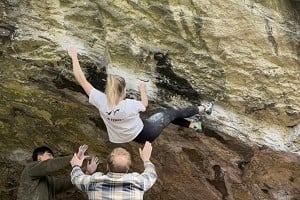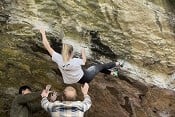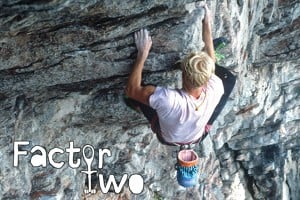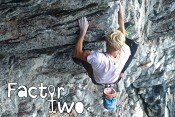

Amanda Vestergaard shares her story of climbing with anxiety, and explains how getting out into the mountains - an environment 'often hailed as a miracle cure' - won't improve mental health struggles for everyone.
Last year, my friends and I climbed the Old Man of Hoy. Ever since moving to Scotland three years prior, the stack had been a dream personal objective. We had a perfect day: sunshine, happy ledge belays and hilarious encounters with the on-route fulmar chicks. What photos from this trip won't show you is that two days earlier, I was curled up in my bed, physically ill with anxiety about the trip ahead.
I need to read this in more detail later, but it's really struck a chord with me.
In my case it's sport of any kind. I went to a comprehensive school in the 80s where the PE teacher played by Brian Glover in KES was seen as being something to aspire to by the staff. Anyone who wasn't good at sport was bullied by both staff and kids.
Fortunately (for me) there were a few fatter, slower kids than me that took the brunt, and I managed to pretty much keep off the radar.
However that fear at being forced to compete and possibly losing and being humiliated has never really left me. I'm an average runner, (when I'm not injured), but prefer to run alone.
I enter fell races because I like being on the fells, and do parkruns to meet mates and it's good for socialising the dog, but I'd be lying if I said I didn't lay awake the night before worrying about doing either.
I have tremendous sympathy for Amanda but find myself completely unable to offer any helpful comment except stick with it and I think you have a great attitude. Apologies for being so ... empty.
Thanks Amanda. I sometimes boulder with a young guy who battles with anxiety, and you’ve given me a bit of insight as to why he can be relatively oblivious to some danger, or very variable in scope on different days.
Great article, and some amazing photos (which as you say hide all sorts of things).
Thanks for an interesting article on a topic that always remains relevant for many - perhaps most! - of us.
Within the general sense that it is a good and overdue thing that we are discussing mental health more, I do feel that mental health is often dealt with in a simplistic and even opportunistic way. We saw that with the pandemic: mental health became something for politicians and the commetariat to cite by reflex, without any meaningful engagement with it as an issue and lived experienced. Without pointing fingers or necessarily even blaming anyone, I think there is a danger of this within the mountaineering/outdoor community, too. It's therefore quite refreshing to see an article operating as a bit of a corrective to this, with a frank discussion of lived experiences and gently deflating the idea that the outdoors is "a cure".
Personally, I feel that if we want to take meaningful action to improve people's mental health, it will not be found in "curing" or "treating" individuals, but in bringing about fundamental changes to the metabolism of our society: the ways we work, the ways we consume, the ways we undertake the labour of caring for each other, the relationships of power that operate within our society, the daily affronts to our dignity, autonomy and sense of justice.
Good piece. One thing I find really important is managing post exertion cool down. My body doesnt know the source of excess cortisol (whether work, emotional or excercise related) and I can often feel worse once the immediate high has worn off, so the cool down process needs to be managed well.
I find when i'm rough anything more than walking can be too much!
For me i dont worry about the excercise, more what my body will do afterwards
Love this article. Thank you.
Thank you, Amanda: I think this is a really good, genuinely well-written and important article.
So much of it resonates with me. If asked to pick a specific example it would be: "...rushing out the door on a Friday afternoon with half an hour's notice ... is not always an option. I need a plan, a safety net, and maybe a day or two to mull things over and prepare myself. Otherwise, I find it very easy to make excuses to stay home, within my comfort zone, only to regret missing out shortly after everyone else has left: an endless cycle of anxiety, defeat, and regret."
I also thought it was refreshing to see someone put this in writing: "Altering your plans to suit your mental state is not weak, and staying home is not giving up. ... Ultimately, only you can judge your own abilities in the mountains."
I've been very fortunate to have had friends and climbing partners who have understood and accepted these issues, even if it sometimes meant that they had to miss out on the planned activity on that occasion, being wise enough to know that, as you say: "the mountains will still be there".
Lastly, I'd like to add how much I appreciated the fact that you avoided trying to suggest any kind of universally applicable, panacea-like solution to the problem. I believe that we each have our own, special demons to manage, and what works for one person can rarely be guaranteed to work for someone - far less everyone - else.
The sky over the top of the crag was crystal blue, the rock dark in shade. My eyes were drawn to the twin ropes snaking down the route, taking different paths as they were clipped through runners, each ending in a knot tied around my harness. Then came the words I had been dreading: “Climb when you’re ready”.
Hello, my name’s Tony and I suffer from depression; that’s how you’re supposed to start these things, isn’t it? It’s truer to say that I did suffer from depression and still sometimes do. Like the chicken pox virus, once it’s in your system it’s there for good and it can flare up when you don’t expect it. Having spent the better part of a year living with it that first time I was eventually ‘socialised to the CBT programme for anxiety management’ is I think how the GP’s note put it. CBT - cognitive behaviour therapy - doesn’t work for everyone but it worked for me. It gave me the understanding of what I’d been through and the tools I needed to deal with it and head off future episodes before they became intolerable.
But, back at White Ghyll on that sunny May Sunday, I was in trouble. I recognise it now, years later, as a panic attack; shivering, confused, afraid. The bravest thing I could have done was to bail out, let my partner ab down for the runners, leave. I took the coward’s way out and started climbing.
I was a mess. Fingers numb, toes curled inside my rock boots as though to get too close to the rock would cause harm, muscles in my back cramping. I knew, theoretically, I could do it, the climb was well within my capabilities or at least it would have been, usually. That day, less so. The first runner came out easily, which was a relief. If it had been obstinate I might have burst into tears and I’m sure no-one would have wanted their day disturbed by the sight and sound of a 41 year-old man sobbing. Bit by bit, with more requests for tight rope than I think I’ve ever made, I got to the belay. I could have mentioned what I was going through to my partner, someone I’d known for many years and done many climbs with, I could have been frank, honest, open. He wouldn’t have minded. Instead, still shivering, I took the gear and set off up the next pitch.
After you’ve done something for nearly twenty years, there’s a memory in the muscles and somewhere below the level of consciousness in the mind. That’s what got me up the rest of that climb, my awareness numbed as though the body had shut that system down to divert energy elsewhere. Looking back, I can’t believe I did that; it’s probably one of the most dangerous, most utterly stupid things I’ve ever done all because I was too proud, too ashamed, too scared of admitting something about my mental health to someone I knew well. He wouldn’t have minded but me? Proud, stubborn, ashamed, scared, unwell.
Not every drink driver gets caught on their way home from the pub; not every drink driver crashes their car. Not every mentally unwell climber fails to lead their pitch but now, I can’t believe I did. I remember watching the occasional walker crossing a path nearby and envying them their simplicity, their freedom, their absence of stress. But really, what did I know? That walker could have been the happiest man on God’s green Earth, he could also have been suicidal and on his way to jump from a high cliff. I didn’t know, couldn’t know, I only presumed.
Eventually the route was done and I was quick to say that no, I didn’t fancy another. I rushed down the track back to the car, bid a hasty farewell and - there is no other word for this - fled, back to the motorway, back down the motorway, back home. Safety, security, things I knew, boundaries I recognised.
I got better, eventually. CBT worked for me and now, whenever the haze of self-doubt comes calling, or low self-esteem, magnifying small things so that they become big problems, setting myself far harder, higher, better standards than I’d consider reasonable for anyone else, well now I have the tools to deal with them. And they do come calling and I’m guessing they always will; but now I know what to do.
One thing is not to do something if there’s something inside me that’s saying I shouldn’t. Saying no to other people can be hard: saying no to yourself can be even harder. But like a gypsy reading tea leaves, I have learned to interpret the signals. But it can still be hard, saying no. It can also be the best thing I can do. If you know someone that’s been going through a tough time, respect their choice when they refuse. It’s been harder for them to say than it is for you to hear.
Another thing I’ve learned is to look upon myself with a little more compassion. It’s a tough road, no wonder I’m knackered. I have to cut myself some slack every now and then, I’m doing the best I can. If I have to take five, or fifteen, or a day, leave me be. I’ll be back when I’m ready.
And, always, remember that you can’t know what’s going on in someone’s head just by looking. Ask, and respect the answer.
It’s been interesting reading both the article and people’s responses. If reading this helps someone, then that’s terrific. Thanks for persevering to the end.
T.
Great article. Well done. I personally am a climber that suffers pretty badly from anxiety and OCD. At periods of my life I’ve found climbing a release and at other periods I’ve found it the main contributing factor to my bad mental health. Refreshing to read an honest, personal take on another’s journey. 👏🏻👏🏻
Relatively straight forward scrambles - how ? Unroped on steep ground in mountains ? - I’ve seen so many people gripped and traumatised in such places - with good reason - one wrong foot and its all over.
Trad leading is also a place not to go if it is not going to be a positive experience. Some people just dont like it and inflict it on themselves like going to the dentist and are just smiley and pleased and relieved when its over - like after a filling.
I respect and support people who say “I just don’t like this “
Either thrilled , engaged and focussed or uncomfortable vulnerable and threatened - it takes an ‘inner locus of control ‘ to just make decisions for yourself and follow your own path and not one that is put in front of you.
I found immense relief from a period of severe anxiety in the mountains and in climbing. But just reading your article makes me feel anxious.
A big part of it for me was enjoying it in a way that I was physically as safe as I could arrange to enjoy the exposure and movement on rock. That means a lot of climbing with people far better than me and most importantly climbing with people who I trust implicitly.
I rope up early on scrambles, don’t trad lead harder that I feel comfortable with on the day. Then you get all the advantages of exposure, exercise and green space without a building anxiety beforehand about how it might go.
I am a qualified mountain leader but I don’t lead hard and am not in a competition with myself or anyone else about what I “should” or “aught” to be doing. I just look to do it for pleasure and doing so in combination with quality therapy has been life changing.
Wishing you all the best.
I have been learning to deal with anxiety that had slowly been building up over a number of years, finally coming to a head after 7 weeks of injury induced isolation and lockdown where I didn't leave my room for a long time.
There's not many things that really get rid of the anxious feeling and intrusive thoughts, but I'm very thankful and lucky that being on the sharp end of a route is one of them and the focus that it brings me afterwards is immense. On a weekly basis, the only free feeling I get is from being above gear and feeling and embracing the fear that it instills in me. Whether or not that is a healthy coping mechanism, I don't know, but it helps so it's nice to have that something to hold onto.
It's always interesting to hear different peoples response to climbing and how anxiety effects us. For me, the hardest part is leaving the house, once I'm in the car and at the crag and climbing I turn fairly calm and unaffected. I think I learned to accept that climbing is meant to be quite scary and sometimes daunting and if it wasn't then it would be boring. I guess we all like to feel in control but we can't be in charge of everything so learning to let go of that and just manage what I can was quite liberating and helped me come to terms with things I found scary or dangerous. The more I took myself to these places and put myself in those situations and became familiar and accustomed to them, the less I found them to be frightening.
It's a long term battle but I can't imagine where I'd be right now without climbing and mountains, they really are a bit of a saviour for me personally. Hopefully this article will help people who can relate to reach out for some help or just to give them a bit of positive confirmation that they're not alone in how they feel.
I have a lot of respect for Amanda for writing this, it can't have been easy and the final sentence is worth re-reading: "For those moments, battling the mental barriers and everything that comes along with them is worth it. Every time."
When we put things out into the public domain we open ourselves up to comment. Seeing different perspectives, especially ones we disagree with, challenges our own beliefs and can faciliate growth.
I think it's a shame that UKC decided that its readers are not capable of reading and critiquing an alternative point of view and instead deleted Andy Kirkpatrick's comment & banned him from posting. Clearly UKC can moderate in whatever way they see fit & as users, we can all decide whether we use the service. I do hope UKC reconsider this.
https://www.ukclimbing.com/forums/info/guidelines.php
"Controversial opinions - Controversial opinions are suitable for discussion and are best confronted on the forums if you disagree with them."
I'll second your opinion on how the forum seems increasingly intolerant of oppositional perspectives. Sign of the times really. In my experience they do not provide logical justification to the moderation enacted. The pressure to project a certain image seems to be a higher priority than having an open discussion. At least they should update the guidelines to honestly state "we will not tolerate controversial opinions/topics" or list subjects they find too taboo for dissent. Align the guidelines with the actual moderation taking place or allow discussion as per existing guidelines.
Good article and well written by Amanda, highlighting how living with anxiety is an on going situation for some of us with GAD and how some days are harder than others at the crag.
I do find the opening strap line somewhat off beam though: "getting out into the mountains - an environment 'often hailed as a miracle cure' - isn't a catch-all mental health prescription for everyone".
I don't think as mental health professionals we have ever spoken about how the outdoors, crags, hills and dales are a 'miracle cure'. We do see how it helps improve mood and helps reduce feelings of isolation and graded exposure to such environments can help with phobias and anxiety.
There are many living with mild/moderate/severe mental health who find it difficult to be out and about in society and being in the great outdoors can be but one element of their ongoing and lived experience of recovery. Our environment does indeed have a big part to play in shaping our mental health. Moreover there is a large body of evidence which states that being physically active is a positive factor as we know, however it's not a magic wand by any stretch and can be just one part of a bigger picture of people's wellbeing plans, or be a major causal factor in their struggles.








